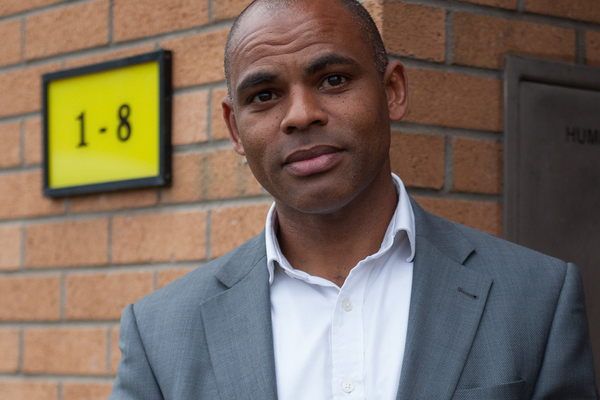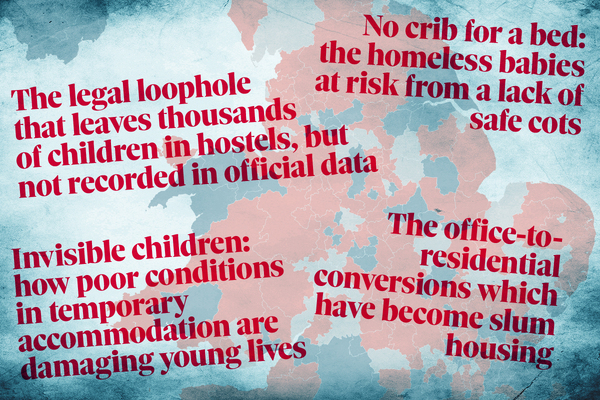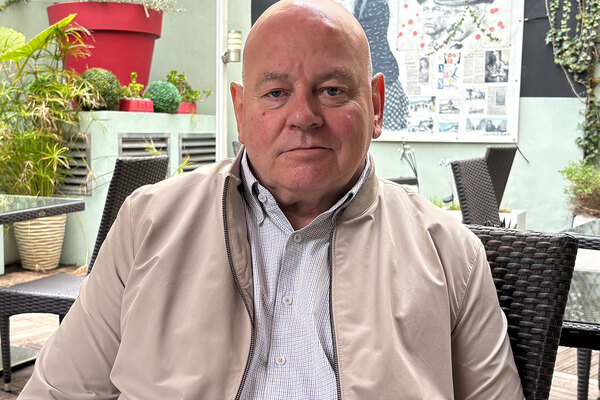Who's Who in Local Authority Housing Development List
Our power list of the council heavy hitters driving the delivery of new homes
Introduction
Our Who’s Who Local Authority Development List highlights those individuals who are leading the way in town halls
The list consists of 41 high-flyers, selected by an expert panel, who are driving the development of homes across Britain. It is intended to promote discussion of their achievements.
Scroll down to read the full list, or click here for more information about how the list was compiled.
Project sponsored by:

Accelerators
The ones who are moving at a rapid pace
Clive Skidmore - Head of development, Birmingham City Council
No list of local authority development would be complete without a mention of Birmingham City Council, which has delivered around 2,500 homes since 2009 – making it the biggest builder in the city. The council continues to strive for further development through the Birmingham Municipal Housing Trust, in addition to a host of other development-boosting initiatives.
Clive features as an accelerator here for the second year in a row: testament to his leadership in driving development ambition.
As part of the council’s plans to build 1,500 homes before 2020, as it strives to meet a target to see 89,000 new homes in the city by 2031, it has led on engaging the government in talks over a regional housing deal for the West Midlands. These talks’ continued pushes for investment in new build are commendable.
Darren Rodwell - Leader, Barking & Dagenham Council
Darren was in last year’s list as a visionary. Described by one as “a force of nature”, our judges felt that in the past 12 months, he has started to put that vision into practice.
As leader of Barking & Dagenham Council, Darren is overseeing one of the largest regeneration and growth projects in the country. Earlier this year saw the launch of its Be First company, which will handle the council’s planning functions, manage the many regeneration schemes across the borough and build homes of its own. The upshot is a projected 50,000 new homes delivered and 20,000 new jobs created over the next 10 years.
Be First adds to the council’s housing company, Reside, which has built hundreds of new homes for London Living Rent.
Philip Glanville - Mayor, Hackney Council
Philip is a big personality heading up a council with big ambitions. As cabinet member for housing, he championed council development of all tenures and has continued that enthusiasm in his new role.
Our judges were impressed by Philip’s ability to shape the agenda in a strong team at Hackney. Under his leadership, the council is undertaking a 9,000-unit regeneration programme, including infill schemes of its own at 18 sites across the borough, with more than half of the new homes for social rent or shared ownership.
He has also established a £16m Right to Buy receipts fund, inviting housing associations to bid for the cash to boost the number of affordable homes built in the borough.
Steve Packham - Chief executive, Chelmsford City Council
Steve Packham died following the judging of our power list. Mr Packham lost his battle with lung cancer, aged 66.
As Chelmsford’s chief executive, Steve played a vital role in helping the local authority reach its housing delivery goals.
The council has ambitious long-term targets for the future, with the delivery of 10,875 new homes planned across 40 sites from 2021 to 2036. Judges praised the council’s continued ambition and track record of delivery, which has seen Chelmsford out-perform its own delivery targets time and time again.
It is the “tone from the top”, aka Steve’s leadership, which helped to present the council as a can-do partner for housing delivery.
Roy Whitehead the leader of Chelmsford City Council, said: "Steve’s death is a terrible loss for everyone at Chelmsford City Council. He has been an extremely hard working public figure."
Philip Roberts - Corporate director, North Kesteven District Council
Our judges praised North Kesteven as a “hugely innovative” council, “really showing how it can be done as a smaller authority”.
Philip joined the council in 2004, as head of housing and property services. As corporate director, he oversaw construction of the first new council homes by the authority in decades, using innovative straw-bale building techniques. It has built 200 homes over the past eight years, a huge number for a rural council in a period pervaded by political and economic barriers to local authority development. That includes regeneration of the district’s oldest estate in Sleaford.
Gerry Clarkson - Leader, Ashford Borough Council
Few councils of comparable size have the same level of professionalism in their housing programmes as Ashford. In 2015, it became the first authority in the South East to be classified as ‘Housing Business Ready’ by the Housing & Finance Institute. It is now delivering £668m of investment across the borough, largely thanks to its leadership at a political and official level.
Gerry spent 30 years in the fire service before coming to politics, rising to chief executive of the London Fire and Civil Defence Authority and chief fire officer for the London Fire Brigade. He was elected Ashford Borough Council leader in 2013, as a prime example of the authority’s forward thinking and determined approach to development.
Tracey Kerly - Chief executive, Ashford Borough Council
Tracey was appointed chief executive last year after 25 years at Ashford. She cites the regeneration of the Stanhope Estate as her proudest housing achievement. Delivered through a private finance initiative and with close community consultation over a number of years, the project replaced nine unpopular 1960s blocks with a vibrant mixed-tenure alternative.
Along with council leader Gerry Clarkson, Tracey has focused on bringing a businesslike, commercially focused approach, with a forward-thinking and persistent stance on development.
Peter John - Leader, Southwark Council
Southwark is the third-largest council landlord in the country, with around 37,000 homes. It has engaged in huge regeneration schemes across the borough, and shown an unparalleled willingness to invite development – notably through volunteering to part-fund an extension of the Bakerloo Line.
Peter and his team have also been eager to make the case for council development throughout London and beyond.
At times its programmes have proved highly controversial, grabbing headlines for the wrong reasons. However, our judges were impressed by the levels of delivery in the borough under Peter’s strong leadership. “He is setting out a vision for Southwark,” said one.
Influencers
Meet those leading the agenda nationally
Lord Gary Porter - Chair, Local Government Association
Our judges were impressed by Lord Porter’s preparedness to put his head above the political parapet to argue for greater levels of council housebuilding, and disagree with his Conservative colleagues.
One noted a key change in the LGA’s rhetoric in the past 12 months and said Lord Porter has become “a national influencer” by encouraging people within the organisation to fly the flag for new local authority development. That message has become louder and stronger, and appears to be having an impact at the highest level.
He names his own proudest housing achievement as overseeing the first pair of semi-detached homes built by South Holland District Council – of which he is leader – in 2006. “For years I’d been told as leader that councils couldn’t build houses,” he says. “I still smile with immense pride every time I drive past them.”
Sir Edward Lister - Chair, Homes and Communities Agency
There were murmurs of concern from some when Sir Edward was named chair of the Homes and Communities Agency (HCA) back in June 2016. He was a London-background appointment in what was already a London-heavy HCA.
However, our judges noted how swiftly Sir Edward moved to “completely allay any concerns”. He has travelled the length and breadth of the country, championing the principles of February’s Housing White Paper, to which he was a key contributor.
With a direct message and a penchant for openness, he is working with his chief executive, Nick Walkley (who made last year’s list), to be a powerful voice in the world of local authority development.
Jacqui Gedman - Chief executive, Kirklees Council
Colleagues describe Jacqui’s “innate ability to energise a room by simply being there”. She was recently confirmed as the permanent chief executive at Kirklees, having sat as interim for several months.
In that time, Jacqui has navigated thorny politics with experienced diplomacy to deliver the council’s Local Plan, and helped refresh the relationship with its ALMO, Kirklees Neighbourhood Housing. The authority also has plans to establish a housing development company under her watch, developing homes at a range of tenures. As one of our judges said, the council “is on a good journey”.
But Jacqui is also having a significant impact on development beyond her own authority. She is the lead chief executive for the Leeds City Region for housing and regeneration, with its plans for 20,000 new homes on brownfield land by 2028, and is set to become lead for the whole of Yorkshire.
Stephen Hills - Director of housing, South Cambridgeshire District Council
Stephen was praised by our judges for taking a leadership role across his whole region.
It’s telling that he was nominated by a major regional housing association, which said he was “instrumental” in securing the devolution deal for Cambridgeshire and Peterborough, including a £100m affordable housing fund. With Stephen at the forefront, the seven authorities involved pulled together a business case for the Department for Communities and Local Government in just four months.
He continues to work with the combined authority to help it set up a housing programme, and is chair of the Cambridge Sub-Regional Housing Board.
He has also co-authored a number of reports and research projects, and regularly speaks at sector events.
Martin Swales - Chief executive, South Tyneside Council
Martin has worked to drive development in the North East for decades. As the SOLACE spokesperson for economic growth and housing, he led the 2015 policy document Addressing the National Housing Challenge, which is continuing to influence ministers.
His own authority is building 100 affordable homes a year through its South Tyneside Housing Ventures Trust, and is setting up a private sale delivery vehicle and a private landlord company.
Paul Mains - Group managing director, South Tyneside Homes
Paul was described as “fantastic” by one of our judges, and lauded for exporting his knowledge by working with organisations as far away as London.
This year, he has led on the council’s in-house construction company, getting back on site for the first time in several years. He has also succeeded in convincing the council’s adult services department to commission its development subsidiary to build schemes for people with care needs.
Nick Murphy - Chief executive, Nottingham City Homes
Of the 775 homes built by all ALMOs last year, Nottingham City Homes delivered 185 of them. That is testament to an improving relationship between the landlord and its council, which was awarded strategic local authority of the year at the 2017 UK Housing Awards.
Nick has influence beyond his own organisation, having previously helped develop national housing policy in the senior civil service and as a board member of the Chartered Institute of Housing’s policy advisory committee. He featured as a visionary in last year’s Who’s Who.
Mark Lowe - Head of regeneration and housing delivery, Nottingham City Council
Mark Lowe has played a leading role in forging relationships with housing association and private sector partners to take advantage of the first wave of government funding for new council housing development.
Following the Housing Revenue Account self-financing reforms, Nottingham City Council, in partnership with its ALMO, has facilitated the biggest new council housing development programme in a generation.
Together, they are eminent examples of how council-ALMO partnerships can deliver across a vast stock portfolio
Ones to watch
Introducing the new movers and shakers
Cath Shaw - Deputy chief executive, Barnet Council
Cath is responsible for Barnet Council’s housing growth and regeneration programmes.
She has played a vital role in planning the wider regeneration of Brent Cross, as a director of the council’s joint venture company with Argent Related to deliver a new town centre at Brent Cross Cricklewood. The mixed-use scheme is expected to deliver 7,500 new homes in the area.
Another major regeneration scheme Cath has helped to spearhead has been that of the Grahame Park Estate in the north-west of the borough. This particular project aims to deliver approximately 3,000 new homes by 2032.
These two projects feed into an impressive overall development pipeline of 27,000 new homes for the council across the next 10 to 15 years.
Paul Parkinson - Service director – housing (deputy chief executive), Ashfield District Council
A former colleague of Paul – the chief executive of Bolsover District Council – has previously compared his ability to drive through change in a room to the protagonist of 12 Angry Men.
He joined Ashfield less than a year ago, but has already made great strides towards ramping up development in the district. Through canny financial manoeuvring and housing management, including cutting rent arrears by 30%, he has managed to bring the authority back from the brink of its Housing Revenue Account borrowing cap. It is now gearing up to build 300 units in the next five years through a variety of avenues.
What’s more, Paul is pushing his authority into new arenas, including taking on Section 106 sites rejected by housing associations and embarking on an asset rationalisation programme.
Lorraine Mealings - Head of housing and customer services, and deputy director of housing, Bournemouth Borough Council
According to our judges, Lorraine “is a person of real talent”, flourishing under the monitoring eye of Gary Josey – Bournemouth’s director of housing and communities, who was named in last year’s list as a performer.
Yet she is certainly no novice, with a housing career spanning 20 years and more than a decade at Bournemouth Council. There, Lorraine has led on establishing Seascape Homes and Property – a council company that purchases open market units and lets them to homeless households through assured shorthold tenancies. The project has already secured £30m of council investment just two years in, and kept 30 households out of B&B accommodation.
In addition, Lorraine has spearheaded closer collaboration with the council’s neighbouring authority Poole, establishing a joint housing development strategy and joining forces on homelessness outreach projects.
Gary himself predicts that she will be “a progressive and dynamic housing influence for many years to come”.
Clare Coghill - Leader, Waltham Forest Council
Clare was only elected leader of Waltham Forest Council in May this year, but our judges noted how she “has completely changed the attitude and culture” in that short time. They praised her fresh ideas, enthusiasm and visionary style of leadership.
She has set housing firmly at the heart of driving growth in her borough. The council has ambitions to see 12,000 homes built by 2020, and Clare has taken a hands-on approach to reaching that target, meeting frequently with residents, community leaders, developers and housing associations.
Performers
Meet the people delivering solid results
Bill Flood - Managing director, Wokingham Housing
Bill runs Wokingham Borough Council’s three housing companies: developers Wokingham Housing and Berry Brook Homes, and for-profit registered provider Loddon Homes. Each company has received widespread praise for the quality of their product, and our judges felt Bill represented the best at a “very high-performing council”.
With previous experience in the Housing Inspectorate, housing associations, local government and at Grainger plc’s affordable housing company, Bill is credited with driving the success of these companies. He cites the perseverance to gain for-profit registered provider status for Loddon Homes – a nine-month process – as an achievement of which he is particularly proud.
It was the first wholly council-owned organisation of its kind in June 2016.
Tracey Lee - Chief executive, Plymouth City Council
Tracey has overseen some very impressive harbourside housing development in her tenure as chief executive of Plymouth City Council. An example of this regeneration is the city’s Georgian docks. The site was turned into a mixed-use residential scheme, with impressive results.
Her proudest achievement at the council has been the delivery of the 5,000 new homes in Plymouth over five years. She has also overseen the arrangement of a £50m affordable housing loan facility to support registered providers, housing co-operatives and community land trusts to deliver new homes at a time when the council faces a difficult financial climate.
Overall, our judges praised Plymouth for pulling “well above its weight” and said that other local authorities could learn a lot from their approach to development and regeneration.
John Black - Portfolio holder for housing and infrastructure, Hull City Council
As cabinet member for neighbourhoods and housing, John has drawn on his past experience as a housing professional in order to meet local development challenges.
In recent years, Hull has repeatedly exceeded its yearly target to build the 600-plus homes required to meet need in the city, despite relatively low developer activity. John has focused on forging partnerships with builders and ensuring that a strong pipeline of land is brought forward, with enough sites now in place for more than 4,000 homes on council-owned land.
Our judges felt John has managed to consistently deliver by “using all the tools at his disposal”. That includes capital investment programmes and funding for development bids, as well as land partnerships and bringing empty homes back into use.
Su Spence - Chief executive, Poole Housing Partnership
At the helm of Poole District Council’s ALMO, Su has been instrumental in the cross-authority work with Bournemouth.
She has pioneered collaborative work elsewhere too, proactively approaching the local housing association Sandbourne with a development opportunity on a church-owned site that the ALMO had not been able to take on. Sandbourne is now working up a strategy to deliver 10 social homes on the site. The landlord praised Su’s working style, saying she avoids the “box-ticking” local authority stereotype.
Poole Housing Partnership itself has recently carried out the development of a 54-unit extra care scheme, complete with a community hub to help people with dementia and disabilities, and is working on its next major 62-home project
Pat Ritchie - Chief executive, Newcastle City Council
Picture: Jon Enoch
Pat appeared on our list last year as an Influencer, but her efforts in driving proposals for devolution of powers and funding in the North East of England has seen her move over to the performer category.
Judges highlighted her vital role in picking up the pieces of that devolution deal and embarking on partnerships with other local councils to deliver new housing in the region.
Pat is particularly proud of her persistence in pushing through a 1,800-home development in the west end of Newcastle, a part of the city that has suffered high levels of deprivation over the years.
Alan Russell - Senior manager – housing condition and supply, Fife Council
Alan has been working in local government and housing for 35 years, with 21 of those spent at Fife Council. There, he oversees its affordable housebuilding and regeneration programmes – the most ambitious of their kind in Scotland.
From a low base of 98 council homes delivered in the five years up to 2012, he has overseen a £300m plan to build more than 1,200 in a similar period since.
To ensure its success, Alan has established a dedicated programme team with staff from various departments within the council, including planning, building control and communications.
He is also fully immersed in the community outside his day job, as a committee member of Hillcrest Housing Association, chair of substance misuse charity FIRST, and a senator at Junior Chamber International.
Carl Brazier - Director of housing and customer services, Stoke-on-Trent City Council
Carl also featured as a performer in last year’s Who’s Who. Under Carl’s watch, Stoke was the first council in the country to be declared Housing Business Ready by the Housing & Finance Institute. It continues to deliver through its Fortior Homes company, which is set to build 400 homes by March 2019, including 150 for high-end market rent. It’s also working on one of seven Housing Zones in the city which Carl helped establish, which are expected to deliver 1,200 homes with help from the Homes and Communities Agency.
In addition to securing Department for Communities and Local Government funding for a 500-home regeneration scheme and the revival of the council’s lauded £1 empty homes programme, Carl has been leading discussions with government over a potential bespoke deal to grant Stoke greater borrowing flexibilities, with just two other authorities.
Visionaries
True transformational leaders
Emma Osmundsen - Shadow director (development), Exeter City Council
A chartered surveyor of 20 years, Emma has overseen Exeter City Council’s return to building homes again for the first time in a quarter of a century.
She has also championed the development of low-energy, sustainable homes. Under her guidance, the authority delivered the UK’s first multi-residential Passivhaus scheme – which it claims “is probably the healthiest, most climate-resilient and energy efficient” in the country. It has ambitions to deliver 600 more through its development company, including the UK’s first Passivhaus extra care facility.
To ensure cost-effectiveness of these high-spec homes, Emma established a contractors’ framework for public sector bodies hoping to build similar products. This has had the dual effect of driving down the cost of development and giving other authorities greater opportunity to get involved.
Claire Kober - Leader, Haringey Council
Haringey Council has set itself firmly on the local authority development map this year with its plans for the Haringey Development Vehicle – a joint venture with developer Lendlease to which it will transfer half its housing stock for regeneration.
Our judges said it was a “brave thing to do”, and noted how controversial the decision has been, but felt it to be “innovative and visionary…
a serious attempt to deal with long-standing issues” in the borough’s council housing system. They were impressed that Claire has “stuck to her guns” as leader to see the plans through the cabinet.
Outside her work in Haringey, Claire is chair of the regional local authority body London Councils.
Joanne Roney - Chief executive, Manchester City Council
Picture: David Oates
Joanne joined Manchester City Council as chief executive in April. There, she plays a crucial role in how devolution shapes the city’s future through her interactions with Andy Burnham, mayor of the Greater Manchester Combined Authority, and the region’s other key stakeholders, as they strive to build 227,200 homes over the next 20 years.
Housing providers at least can be sure that Joanne understands their businesses and aims, having begun her working life as an apprentice in Birmingham City Council’s housing department at 16 and held director roles in the housing teams at Kirklees and Sheffield councils. She was awarded an OBE for services to local government in 2009.
Manchester City Council has also been working to boost its own portfolio with the establishment of its £10m Housing Affordability Fund, which aims to deliver 2,500 homes of a range of tenures over the next five years.
Jenny Laing - Leader, Aberdeen City Council
After taking over as leader of Aberdeen City Council in 2014, Jenny has been at the forefront of attempts to propel the authority towards new growth.
The authority demonstrated its visionary credentials when it became the first in Scotland to issue a bond in November last year. It raised £370m to put towards its £1bn capital and infrastructure programme, which includes plans to build 3,000 homes over the next 15 years.
As council leader, Jenny has been praised for her enthusiasm to inspire positive change and push the authority to break new ground.
Susan Aitken - Chair, Glasgow City Region
Susan Aitken is the chair of the Glasgow City Region and leader of Glasgow City Council after the SNP ousted Labour from the council in May. In her city region role she is overseeing an ambitious plan to build 110,000 homes in and around Glasgow by 2035. Part of the £1bn Glasgow City Region deal struck with the Scottish and UK governments, eight councils in the region are seeking first refusal on public land for housing developments. This housing strategy could make a huge contribution to the Scottish Government’s pledge to build 50,000 affordable homes by 2021. Ms Aitken was originally a member of the Labour Party, but switched to SNP in 2000.
Sir Steve Bullock - Mayor, Lewisham Council
This year marks the last of many in which Sir Steve has stood as a vocal champion of council housing for London, as he is set to retire next May.
He has been mayor of Lewisham since 2002, executive member for housing at London Councils since 2010, and sits on Sadiq Khan’s Homes for Londoners board, as well as the Housing and Finance Institute. During his time at Lewisham, he has seen the authority establish an ALMO and Phoenix Community Housing, a community gateway housing association. The authority was also an early adopter of the now well-established system of building units for market sale to subsidise continued building of traditional council homes after social housing grants were slashed in 2012.
Sir Steve names the opening of Place/Ladywell, the UK’s first “pop-up village” for homeless families, as his proudest housing achievement.
Andy Burnham - Mayor, Greater Manchester Combined Authority
Probably the most high-profile of the metro mayors, Andy has an important job to deliver on the promise of the Greater Manchester Combined Authority (GMCA).
Our judges noted that he has expressed “a clear ambition” to eradicate homelessness and boost affordable development – building on work already done at the GMCA before his arrival. He has convinced housing associations in the region to back his call for a Housing First approach to end rough sleeping.
With £300m to loan out to developers, it will be intriguing to see how Andy and his housing portfolio leader, Salford mayor Paul Dennett, perform against their promises.
Ian Fitzpatrick - Director of service delivery, Lewes District Council and Eastbourne Borough Council, and managing director, Eastbourne Homes
As well his senior director roles at Lewes and Eastbourne councils, Ian runs the latter’s development company. Our judges praised his ability to manage all these responsibilities, and his focus on sharing experiences between the organisations.
Thanks to Ian’s tenacious work to drive housebuilding, Eastbourne was named outstanding new developer of the year at the 2016 UK Housing Awards, while the council’s new housing investment company has built up a delivery pipeline of more than 100 homes. Meanwhile, in June Lewes completed its first homes for more than a decade. Between them, the pair have development pipelines of more than 1,400 homes, and have plans for a jointly owned housing investment company.
Marvin Rees - Mayor, Bristol City Council
Picture: Francis Hawkins/SWNS
Our judges felt that Marvin represents a strong example of an elected mayor inspiring development.
As part of the election campaign, which saw him sweep to victory in Bristol last year, he has pledged to oversee the building of 2,000 homes a year by 2020, including 800 affordable homes. Meeting those goals will be key for a city with one of the worst housing crises in the country.
Under Marvin’s leadership, the council has pledged to invest £175m in housebuilding to help achieve that target – which will help pay for a new council-owned development company and include a £57m grant package for housing associations.
Roger Blaney - Leader, Newark and Sherwood District Council
Along with Sheffield City Council and Stoke-on-Trent City Council, Newark and Sherwood has been engaging with the Department for Communities and Local Government over a potential bespoke deal to enable it to boost development. As one of our judges pointed out, that makes it “a small kid in a big class”, showing ambition beyond its heft.
Roger has acted as the political lead on the council developing and adopting its Local Plan, which anticipates 14,800 new homes in the district by 2026, as well as on the introduction of its Community Infrastructure Levy, which was the first in the country.
Rebecca Rance - Chief executive, Newark and Sherwood Homes
Rebecca has strived to bring the council and its ALMO closer together.
Meanwhile, Rebecca, who has led Newark and Sherwood Homes since it was established in 2004, is pushing to deliver 335 new council homes in the next five years on underused Housing Revenue Account land. She hopes to lift that to 550 over six years if negotiations with government are successful.
Gavin Jones - Chief executive, Essex County Council
Since joining the authority as chief executive in 2016, Gavin has become one of the country’s most influential local government housing figures.
There, he has played a key role in setting up the North Essex Garden Communities company – a partnership between Essex County Council, Braintree District Council, Colchester Borough Council and Tendring District Council. The company, established earlier this year, is part of the first wave of the government’s garden towns and villages initiative first proposed in 2015. It has plans to oversee development of three new ‘garden communities’, providing up to 45,000 homes.
It’s an example of unusually close collaboration between county and district councils, and sees Essex as the only shire authority mentioned in this list.
Andy Street - Mayor, West Midlands Combined Authority
Former John Lewis managing director Andy Street has championed brownfield infill to meet housing need in the West Midlands. He wants to see 165,000 homes built by 2030, spending £200m on preparing sites.
He has also been vocal on his eagerness to work with housing associations to deliver enough affordable housing for the region, committing to “align strategic plans” with landlords in the combined authority’s recent Land Delivery Action Plan.
And like Andy Burnham, he has gone beyond his formal remit to take steps to battle homelessness, establishing a regional task force to get people off the streets.
Helen McHale - Chief executive, Stockport Homes
A performer in last year’s list, Helen’s continuing innovation at Stockport Homes’ ALMO means she finds herself among our other visionaries here.
Helen was responsible for establishing Stockport Homes in 2005 and saw it become the first ALMO to start developing in 2009. Since then, it has pushed on from building on old garage sites, transforming into a housing association writ-large – the largest provider of affordable homes in Stockport. It’s telling that Helen is now vice-chair of the influential Greater Manchester Housing Providers group.
With Helen at the helm, Stockport Homes has more than doubled in size since its inception, growing from 225 staff to 560.
It is contracted to manage the council’s stock for another 25 years, and its development subsidiary Viaduct has ambitious building plans, both within Stockport and beyond.


















































